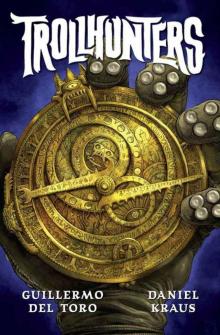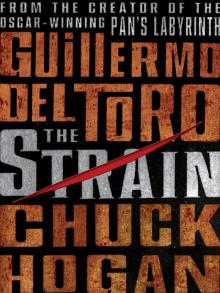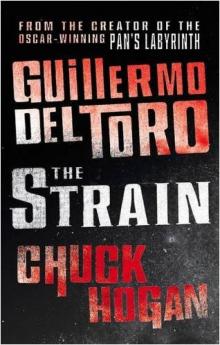- Home
- Guillermo Del Toro
The Shape of Water Page 22
The Shape of Water Read online
Page 22
35
GILES RECOILS FROM the knuckles against his window. The guard makes a cranking motion with his hand. Giles doesn’t know what to do but obey. He rolls down the window, and the guard’s features come into sharp definition: sleepy brown eyes, unkempt mustache, hairy ears. He frowns as he runs the light over Giles’s clothing, and Giles is jolted by memory: Twenty-two years ago, the night of the arrest at the gay bar that got him booted from Klein & Saunders, all those mustached cops and how their flashlight beams across his body felt like assault.
“You don’t look like Laundry,” the guard says.
“Thanks.” This is how a driver would talk, Giles thinks, not thank you, good sir.
The guard doesn’t appreciate the joke. “ID?”
Giles grins so hugely he believes teeth might start dropping from his jaws and pretends to search for his wallet, hoping the guard, cold and tired, will tell him to forget it. There is silence from the guard; Giles has no choice but to produce the ID. He holds it so the guard can read it without touching, but it doesn’t work. With viperous speed, the guard, not so drowsy after all, plucks it. The flashlight turns the ID’s papery stock translucent. Giles can see right through it as the guard scratches it with his thumbnail. The 7 Giles had inked to advance Michael Parker’s age comes off.
“Oops,” Giles says.
“Out of the van,” the guard says.
Then all the lights at Occam Aerospace Research Center go out.
36
ZELDA IS IN the laundry room when it happens. Six years ago, both halves of her duplex were robbed, and she’ll never forget how quickly she’d known that something was wrong. She’d been barely out of the car, Brewster still behind the wheel. Nothing was missing from the front patch of grass; there was nothing to take. And yet, everything was wrong. The grass was wrong, bothered by shoes different than theirs. The door was wrong, the knob rotated in an odd way. Most of all, the air was wrong, half-sucked away by a stranger’s panting, the rest stirred into wasplike agitation.
Staring at the drops of water on the floor, Zelda feels the same direful certainty. Nothing overt is wrong; water gets on floors. Why, then, does she edge around it like a detective around a pool of blood? Because, if she looks closely, the water drops themselves are evidence. They aren’t round beads snug with surface tension. They are slashes, describing a tale of haste—Elisa’s haste. These telltale patterns remain visible to her even after the overhead lights blink out and she is pitched into black.
It is the kind of event that has to be lived with for a minute before it can be believed. Occam is never dark. Even closet lights don’t turn off. An exhausted groan comes from the walls and then silence descends, a true silence bled of white noise, leaving Zelda alone with the drub of her own bodily machinery. No—not entirely alone. Far down a dark hall, she can hear the shrill squeak of the laundry cart with the bad wheel.
37
IF SHE HADN’T already been reaching for F-1’s door, Elisa doesn’t know how long it would’ve taken her to find it in the deluge of darkness. She muscles her cart across the still, shushed lab, the bad wheel screaming in the quiet, her constant dreams of the room her only map until her eyes begin to adjust to the low level of light—the first rays of dawn, she has to assume, eking in from first-floor windows and curling like smoke through ventilation passages heretofore invisible.
The cart strikes nothing until the ledge of the pool. Gray flashes of rocking water wheel through the darkness like thrown knives. Can he see her? Into blackness, she signs with the fever of prayer, words she can only hope that he’s learned. “Come.” “Swim.” “Move.” She’s sprawled across the ledge, leaning over the pool, signing. Water laps against her. She’s still signing, signing. There’s no knowing why the lights went out, but it will foster a panic, and panic will drive people to protect their most significant asset. There’s no hope for the creature, or Elisa, if he doesn’t come, swim, move, and now.
Two golden eyes crest like dual suns. Elisa goes wordless. Next thing, her shoes are off, her legs are in the water, her uniform is wrapping around her thighs like cold tentacles. She shivers and slogs toward him, arms outstretched. The golden eyes are wary, of course they are—he’s been pursued before. Elisa takes another step and the pool bottom slopes dramatically; suddenly the water is at her chin and she’s gasping, and the weight of her clothes drags her farther down the slope, and farther, and now she’s sputtering, and the only signs her hands are making now are the desperate, empty grasps of a drowning woman.
38
THE MONITORS SNAP with static electricity. The screens not yet black. A fading gray, sixteen dying eyes. Nothing’s being watched. Nothing’s being taped. Control is all Strickland has wanted since boot camp, Korea, the Amazon—control over his family, control over his own fate, and now it’s severed, machete into jungle root. He stands. His knee strikes his desk so hard he hears wood crack. He hobbles, tips against the monitor bank, steadies himself with dead fingers. That hurts, too, and he pushes away. It’s black lunar terrain. His foot upsets a trash can. His shoulder rams a wall. He has to fight his way through the doorway, as if it’s a tiny one built for a dog.
Footsteps, urgent but faltering, rise from the hall like a drip of rain. A beam of light scribbles across the black air.
“Strickland?” It’s Fleming, civilian putz, never any help.
“What the fuck”—sudden pain, everything hurts—“is this?”
“I don’t know. Fuses?”
“Well, call someone.”
“The lines are down. I can’t.”
Strickland’s instincts are always finest when it comes to contact. His fist shoots out as if by slingshot. Grabs Fleming by the collar. Their only instance of touching besides the first-day handshake. But it always loomed, didn’t it? The threat a man of blood and soot poses over a pencil pusher, clipboard waver? Fine stitching in Fleming’s collar rips as Strickland curls his biceps.
“Find someone. Now. We’re being invaded.”
39
AN OBJECT PRESSES against Elisa’s back. Seems too big for a hand, but it flexes like one, with palm cradle and finger posts. Another presses to her chest, five claws pricking, just barely, her breasts and stomach. There is strength enough here to squash her, but instead she is lifted, as gently as if she were a butterfly, until her head is out of the water. She coughs against the rolling muscles of a large shoulder as she’s floated backward to shallower depths. She can’t form coherent thoughts: He is holding her, his scales under her hands both soft as silk and sharp as crystal, and though no words pass, everything, everything is being said.
Her body jerks. He’s reached the limit of his chains. She snaps awake, establishes footing, and pulls from her sodden apron pockets the best tools she and Giles could scrounge: A bolt cutter and pair of pliers she’d smuggled in under her coat. The grooves across the creature’s body glow red, but only for an instant. He stares at her, only inches separating their eyes, and then stands upright, his chest emerging so that she can access the chains locked to the harness. Removed from water, his gills begin to fluff, but there is no doubting any of this. He understands. He trusts. He, like she, has nothing left to lose.
She wedges the bolt cutter around a chain link. Instantly she perceives that she’s made a fatal misjudgment. The link is too thick, and the cutter blades can’t get a grip; it’s like trying to bite a basketball. Elisa snugs the chain into the blades and tries to gnaw at it, but it has no effect beyond the flimsiest of scratches. She pockets the cutters and jams the needle nose of the pliers inside a link and tries to pull open the jaws to break it from within. This method gives her no leverage. Her hand slips, and the tool tumbles into the water. She doesn’t try to save it. There’s no point. She’s as red-handed as possible, soaked inside the F-1 pool with Giles waiting outside, with no way at all of cutting the creature free. It feels like a mercy when a man’s voice speaks from the darkness.
“Stop,” he says.
40
GILES BELIEVES HE is turning in a bravura performance as The Man Who Can’t Unlock His Seat Belt when the lights go out. Not only the two lights of the loading dock. All of them: Office windows, sidewalk path, lawns, awnings, parking lots, they all blink shut. The guard steps back from the van, scans the building, reaches for his radio.
“This is Gibson, loading dock. Everything all right in there? Over.”
Elisa hadn’t said anything about the lights going out. Giles takes the opportunity to peer into the side mirror at the loading-dock doors. He wants her to emerge. He also hopes she doesn’t, not yet. This guard isn’t going away. He will need, then, to be distracted. Giles leans out of the window and clears his throat.
“Sir?” He curses softly; that’s not driver-speak. He tries again: “Buddy?”
The guard adjusts his transmitter. “This is Gibson, loading dock, over.”
“Terribly sorry about the ID card,” Giles says. “I’m afraid I’m a little sheepish about my age. See this? It’s a hairpiece. I’m afraid I’m a vain man, though I assure you it does not interfere with my laundry-toting capabilities.”
The guard turns on him, deftly unholstering his gun.
“I’m going to say this one more time, Mr. Parker. Get out of the van.”
41
HOFFSTETLER SLIDES ACROSS the ledge, crashes into the water, grabs Elisa by the shoulder. The creature hisses, a sound like shaving ice, but, for once, death doesn’t scare Hoffstetler.
“Who are you working with?”
He asks because he still can’t believe that music and dancing, those vanguard tactics that kept the Devonian alive, could have been the brainchild of this nondescript janitor. But it takes one second of staring into her despairing eyes to affirm that she is that rarest of all things, a truly independent operative beholden to no principle beyond her sense of what is right.
“You moved the dock camera, didn’t you?” he says. “You’re taking it out of here, aren’t you?”
She nods, and his mind whirls. There are no Russians. He just blew Occam’s electrical grid with Mihalkov’s popper, and the only person here to help him is a frail-boned woman who can’t speak. It’s a situation doomed enough to laugh at, but he thinks of what he used to tell his students. Imagine being a planet. Don’t laugh, he’d tell them. Try to imagine it. Eons of loneliness, and then one day your ellipsis peaks toward that of another planet and there is a gasp of nearness. Wouldn’t you try to make the most of it? Wouldn’t you, too, combust and flare and explode if you had to? That is Elisa Esposito and Bob Hoffstetler: two lonely, unlikely bodies grasping at each other for just this precious instant.
“Tell it not to hurt me,” Hoffstetler says. “I’m going to unlock it.”
42
THE SECURITY-CAMERA screens are cold and lifeless when Strickland barges his way back into his tar-black office. He thunders about, knocking shit over. He feels blind. Handicapped. Like the creature, which can’t hardly breathe regular air. Like Elisa, who can’t talk. His swiping hand knocks the phone from the table. It lands with a pitiful little ring. He wonders if it was the red phone. General Hoyt. Jesus Fucking Christ. If Hoyt hears about this, Strickland will spend the rest of his life making up for it—
There. His good hand wraps around the smooth oak handle of the machete. No, the Alabama Howdy-do. It’s more and more difficult to keep that straight. The steel shaft zings against the metal cabinet behind which he keeps it hidden. He thumbs the switch. The Howdy-do hums to life. He waves it before him as he heads in the direction of the door. This time he doesn’t run into anything. It’s like the office is afraid of him now.
The hallway is lit by the barest gloss of infiltrating dawn. Only a few footsteps and voices echo down the corridors. Whoever fried the fuses knew what they were doing. The shift change is the perfect time to strike. A bottleneck at the elevator. General confusion in the front office. But only a few early birds in the actual halls and laboratories. Who would know this? The same man who’d just been in his office. Bob Hoffstetler. The Russkie. Strickland moves down the hall as fast as the darkness allows, snorting the smoking ozone of the Howdy-do.
“The asset!” he shouts to anyone listening. “Lock down the asset!”
43
NEITHER ARE SUITED for physical labor, this slight woman and this gone-to-seed mid-forties biologist. The laundry cart might as well be filled with cinder blocks. Hoffstetler, though, trusts the properties of propulsion and momentum. They just have to get it moving. But Elisa abandons the handle and leans into the cart to arrange wet towels to better hide the creature inside. She does it with such affection that Hoffstetler hates to snap at her, but he does. This woman has set in motion a plot the Soviet government decided was too risky, and it deserves the reward of a real attempt. She scurries back, they push, the towels rustle with the creature’s fear, and the wheels, weeping in protest, begin to turn.
It takes, by Hoffstetler’s estimation, the length of an entire career to reach the lab door. In the hallway, darkness still reigns, but he knows it won’t last; as Mihalkov said, the popper blows the fuses, but any homeowner with half a brain will be able to fix them. They bear down and push the cart in the direction of the loading dock. The only sounds are the squeaky wheel, their own grunts of strain, and the wheeze of the creature under the towels, until the serrated buzz of an angry voice reverberates from the next corridor:
“The asset! Lock down the asset!”
Hoffstetler knows, at once, what he must do. He takes a bottle of pills from his pocket and presses them into Elisa’s hand. “Mix one of these in the water every three days. Do you understand me? Its water must be kept at seventy-five percent salinity.” She stares in confusion. “Strict protein diet. Uncooked fish. Raw meat. Do you understand?” She’s shaking her head even as he’s handing her the syringe. “If you’re not going to make it, use this. Don’t let them cut it open. Please. It has secrets we’re not supposed to know. None of us deserve to know.” Except, perhaps, this janitor, he thinks. “It can only last thirty minutes out of water. Hurry. Hurry!”
She nods, but it’s loose, as if her head might topple off her neck. There is much more he needs to tell her, a lifetime’s worth of information and caution, but he’s down to mere seconds. He bolts into the darkness, following the bellow of Strickland’s voice.
44
ELISA PUSHES, HER leg muscles shaking, her arm muscles ready to burst. The cart moves by inches, every speck of grit on the floor a massive speed bump she’s forced to surmount. But she hears Hoffstetler calling for Strickland and this lights a fire under her feet as much as the hoarsening of the creature’s breathing. She pushes, and it’s hard, but what’s harder is acting normal at the approach of a confused-looking man, some white coat who, in a detail of almost obscene normalcy, is still holding his cup of coffee. He only glances at Elisa, of course he does, because women like her are invisible. Never has she been so grateful.
She reaches the sharp left turn leading to the loading dock. She can see morning light between the doors. But the stubborn wheel won’t budge. The cart won’t turn. People are coming. She hears footsteps, more than before, and voices of increasing hysteria. She kicks the wheel, and her feet almost slide out from under her. The cart is leaking water, the whole area is slippery. She gets behind the handle again, determined to bulldoze left with sheer strength, but her feet can’t get a grip in the puddle. Her knees hit the floor. She hangs from the cart like a child from a jungle-gym bar, afraid to drop.
Fingers curl around her arm.
45
ZELDA HOISTS ELISA to her feet. The girl is wild, trying to tear herself away, scrabbling for something in her pocket, but Zelda holds tight. Elisa isn’t just shaking. She’s convulsing, breath pounding, eyes blinkless and frenzied. Elisa’s hand rises from her pocket, holding what looks like a hypodermic syringe. A drop of silver liquid hangs from the tip, jeweled in the barest smidge of dawn’s blush. Zelda slowly draws her eyes from the needle’s point
to Elisa.
“Honey,” she whispers. “Settle down.”
Her voice creates an effect that her face hadn’t. Elisa pushes the needle back into her pocket and collapses against Zelda, taking handholds of her uniform. Zelda has felt this kind of rageful hurt only at funerals and lets it happen, wrapping her arms around Elisa’s throttling back. Her uniform is wet. It’s soaking. Zelda looks over Elisa’s shoulder into the pile of wet laundry. White towels, white lab coats, white sheets—
And a single golden eye.
“Oh my God,” Zelda gasps. “Oh my God.”
Elisa pulls apart, grasping Zelda by the forearms, pleading with every quiver. Maybe it’s her ability to use those fingers to talk, but somehow through them everything is answered: why she’s been so cold with Zelda, why she’s tried to drive her friend away. It was because of this, because she didn’t want Zelda to become culpable in this, and it is just this dedication to their friendship that makes Zelda damn all good sense and take her place at the cart’s handle.
“You’re crazy,” Zelda says. “Now push.”
46
STRICKLAND KNOWS THE shadow-shape of Hoffstetler as sure as he knows the Russian’s flat-footed gait. He’s got him. Strickland moves faster, charging up the center of the hall by a single window’s worth of morning rays, ignoring an MP who salutes and asks for instruction. It takes a few steps for Strickland to pick up on a very unexpected thing. Hoffstetler isn’t running away. Hoffstetler’s coming straight at him. Strickland stops, thumbs the cattle prod, readies it at his side, opens his mouth to yell. But Hoffstetler speaks first.

 Cabinet of Curiosities
Cabinet of Curiosities The Complete Strain Trilogy
The Complete Strain Trilogy Trollhunters
Trollhunters The Night Eternal
The Night Eternal The Fall
The Fall The Shape of Water
The Shape of Water The Strain
The Strain The Fall tst-2
The Fall tst-2 Guillermo del Toro's Cabinet of Curiosities
Guillermo del Toro's Cabinet of Curiosities The Strain tst-1
The Strain tst-1 The Strain, the Fall, the Night Eternal
The Strain, the Fall, the Night Eternal